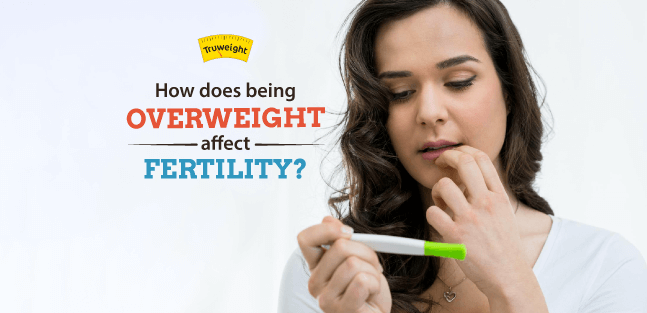Health, Weight Loss
5 Reasons why excess weight might be preventing you from conceiving
Overview:
Any malfunction in one the above steps could lead to infertility. During this entire process, certain fertility influencing physiological changes involving hormones occur.
Your weight plays an important role in conception.
Maintaining a healthy weight is the primary requisite to help you conceive and sustain a normal pregnancy culminating in the birth of a baby.
Conception or pregnancy is a process that involves multiple steps as follows:
- Ovulation or release of egg must occur from one ovary of the woman.
- The egg must travel toward the uterus through the fallopian tube.
- A sperm secreted by a man must join the egg and fertilize it
- The fertilized must get implanted inside the uterus or womb.
Relation between weight and fertility:
The possibilities of your conception and having a baby increases if you have a healthy weight.
Weight imbalance plays havoc with your hormone level affecting your menstrual cycle and quality of your egg.
Obesity can adversely affect the quality of the man’s sperm and factors impacting your libido.
a. Obesity induced infertility:
Your ovaries and fat cells secrete a hormone called estrogen. This disrupts your menstrual cycle and ovulation, thereby reducing your ability to conceive.
b. Underweight induced infertility:
The release of estrogen is affected if you are underweight. This disrupts your menstrual cycle and ovulation and prevents you from conceiving.
5 Reasons that cause infertility due to excess weight:
Obesity is one of the prime causes of infertility. The following are the major reasons that mar your ability to conceive:
1. Increased risk of infertility:
The normal pattern of hormone secretion in a woman is altered. It results in malfunction of your ovaries and irregular menstrual cycles upsetting the ovulation phase.
Abdominal fat causes production of male hormones resulting in decreased ovulation.
2. Increased risk of miscarriage:
This risk factor triples in overweight women, who will be prone to suffer miscarriage and still birth.
3. Incidence of PCOS:
Obesity causes excess secretion of Insulin leading to onset of Polycystic Ovary Syndrome (PCOS). You may suffer irregular menstrual cycle, decreased ovulation and higher level of male hormones causing infertility.
4. Lifestyle issues:
Obese persons may suffer lifestyle related issues like diabetes, high blood pressure and cholesterol. All these clubbed together may challenge your plans to conceive.
5. Inhibits fertility treatment:
The success rate of IVF is substantially lowered in obese women.
Measures to counter the effect of obesity on fertility:
Issues arising out of obesity affecting fertility can be lessened by some simple measures, which are:
- Reduce weight before you plan pregnancy.
- Eat balanced diet.
- Shun vices like smoking and drinking.
- Keep a tab on your partner’s health.
Other factors affecting conception:
- PCOS: Polycystic Ovary Syndrome causes infertility and prevents you from losing weight.
- Stress: Your adrenal system malfunctions due to stress. Meditate and exercise to reduce stress levels
- Insomnia: Inadequate sleep raises your anxiety level affecting your reproductive cycle.
- Ovulation cycle: Understanding the ovulation cycle of 28 days is important to succeed in your attempt to get pregnant.
- Aging: Fertility problems increase with age, the reasons being:
The ovaries fail to release eggs.
- There is a reduction in the number of eggs.
- The eggs are weak.
- There is a general degradation of health.
- You are prone to suffer miscarriage.
- Tubal Factors: Damaged or blocked fallopian tube is often the reason for infertility.
- Uterine factors: Physical problems with the uterus or uterine fibroids are many a times cause for failed pregnancies.
Chances of getting pregnant with PCOS:
Polycystic Ovary Syndrome (PCOS) is a common hormonal imbalance in women caused by ovarian production of higher level of male hormone called androgen.

This can disrupt a woman’s menstrual cycle and impact fertility. The common symptoms of PCOS are:
- Irregular menstruation
- Ovarian cysts
- Infertility
- Weight gain
- Excessive body and facial hair.
- Insulin resistance
The complications during pregnancies increase manifold for women affected with PCOS. The antenatal and postnatal phases are fraught with greater risk due to increased androgen activity. The risks involved are:
- Miscarriage
- Pregnancy induced high blood pressure
- Gestational diabetes
- Premature birth.
- Caesarian Section becomes imperative.
However, effective and timely management of symptoms allow many women affected with PCOS to become pregnant and deliver a healthy baby.
Can losing weight help you get pregnant?
Every individual woman or man is different and studies show that overweight or obese women, improve their ability to get pregnant by losing weight to a healthy level.
It helps you to get pregnant by normalizing your menstrual cycle thereby improve your probability rate to conceive.

The idea is to maintain a healthy Body Mass Index in order to cope with the physiological changes that pregnancy entails for a normal confinement and childbirth.
The data below is an indicator for you to assess where your stand and the steps to adopt to maintain an optimum weight for a successful pregnancy.
- If your BMI is less than 18.5-underweight
- Your BMI is from 18.5 to 24.9-normal
- And If your BMI is from 25 to 29.9-overweight
- Even If your BMI is greater than 30-obese
Based on where you stand, you are required to gain or lose weight with the help of professional advice.
Lost weight and got pregnant:
According to an ICMR bulletin obesity and infertility is directly related. An expert from Mothers Lap IVF Centre, New Delhi has opined that compared to a woman with a healthy weight, overweight and obese women have faced difficulties in getting and staying pregnant.
This is true for both women who are trying to achieve pregnancy naturally and through IVF.
Therefore, to eliminate the risk of lower pregnancy and miscarriage rates, it is worthwhile to believe that you lost weight and got pregnant.
Will losing weight help me get pregnant?
Overweight and obese women experience the following:
- Irregular menstrual cycle.
- Reduced quality of female eggs and male sperms.
- Impaired sex drive.
- Inability to stay pregnant with a higher risk of miscarriage
- Other related problems.
Considering the fact that the rate of fertility is directly related to weight, you will surely get pregnant by losing weight.
Bottom Line:
You can experience a normal pregnancy and look forward to starting a healthy family by ensuring that you keep a check on your weight.
A balanced diet and a cool lifestyle and a mutually beneficial understanding with your male partner may help you to succeed.
More-
However, effective and timely management of symptoms allow many women affected with PCOS to become pregnant and deliver a healthy baby.

This is really a nice blog specially for the women. Thanks for posting such a good blog.
Hi! We thank you for sharing your feedback towards our article. Keep following our blog to know more health information.